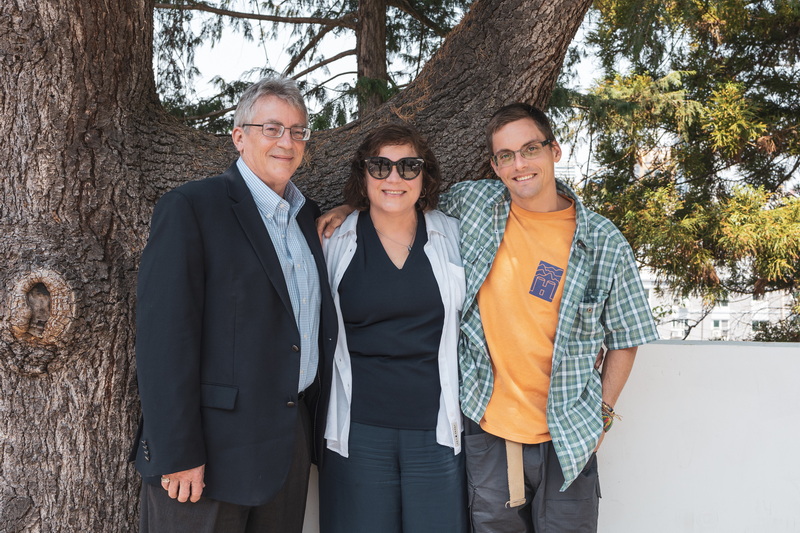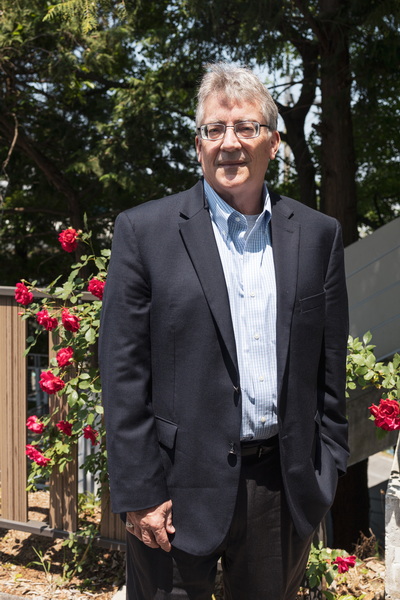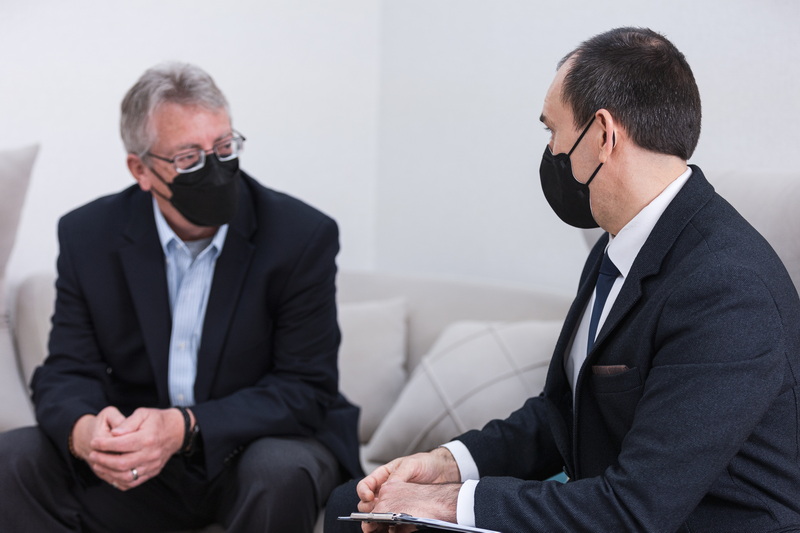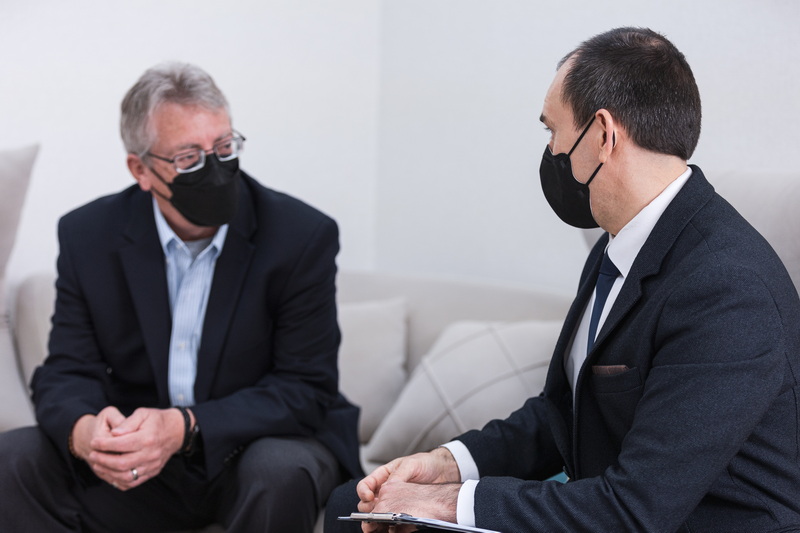Called by Another Name: A David Dolinger Memoir of 5.18
Interview by Arlo Matisz and William Urbanski
Forty years ago, Gwangju, Jeollanamdo and the rest of Korea were very different places than they are today. Nowadays, the roads are paved, the economy is strong and seeing expats going about their lives is commonplace. Most importantly, Korea in 2022 is a free and democratic society.
When David Dolinger came to Korea as a Peace Corps volunteer in 1978, the situation was very different. In his incredible book Called by Another Name, which was co-authored by Matt Vanvolkenburg, he recounts how his experiences treating tuberculosis patients in rural Yeongam and witnessing the brutality of the 5.18 uprising changed the course of his life.
While speaking with Dolinger (who holds a PhD in microbiology and immunology) during his recent trip to Gwangju, it quickly became apparent how the events surrounding 5.18 laid the foundation for his considerable scientific achievements as well as his lifelong commitment to helping those that are marginalized.
Hopefully this interview will provide a glimpse into some of his accomplishments and remarkable experiences.
William Urbanski (WU): Looking around Gwangju, do you think the city has done a good job commemorating the events of 5.18?
David Dolinger: There’s a part of me that thinks it should probably be a lot more prominent than it is. I know there’s been a lot of conflict and discussions around it. At one point they wanted to tear down the old provincial office building which to me would be a travesty, as it is the historical center of 5.18.
To me there are still a lot of unanswered questions. There are potentially a lot of missing people that we need to find and personal stories that need to be told.
Arlo Matisz (AM): Let’s talk about your life in Jeollanamdo back before 1980. It was of course totally different. You came as a Peace Corps volunteer to Korea. What kind of work were you doing?
David Dolinger: I was doing tuberculosis control work and worked in the health center in Yeongam. My job was really to go out and find people that had tuberculosis, make sure they were taking their drugs once we prescribed the drugs for them and constantly following up to hopefully make sure they were cured.
It showed me that diagnostics is the foundation of good medicine. It’s not the drugs, it’s actually knowing that people are sick and the how and why they are sick. With the proper diagnostic we can then optimize treatment for them as individuals.

AM: When the movement broke out, the Peace Corps and U.S. government had ordered an immediate withdrawal from Gwangju. But you and a few of your colleagues decided to stay. Why? Did you feel afraid of staying?
David Dolinger: Let’s get the facts straight on this one. So, I was never contacted by the Peace Corps or the US Embassy. I was in Yeongam. On the 18th I came through Gwangju and on the 19th I took the bus back to Yeongam and worked Monday and Tuesday at the health center. Wednesday, because of my concerns and because of the fact that all communication with Gwangju had been cut off I decided I had to come back because I was worried about my friends.
So, on Thursday, and this was thanks to Tim Warnberg as he knew the number to the Peace Corps office, we called them and they transferred us to the embassy. And they said, “You need to leave.” We asked why and they said there was rioting in the streets. We told them we were standing there in the streets and there was no rioting. The citizens were organizing and cleaning the streets up. There had been no rioting and no looting. We also told them were more afraid of the Korean military that we would have to go through to get out of the city than we were staying in the city. Even that early, the embassy told us, “We don’t really need to hear what you are seeing. We know what’s happening in Gwangju.” What they were telling us that they knew was the opposite of what we were seeing.
AM: After the May 18 democratic movement, you did not leave the country. You stayed in Korea. However, something happened with the Peace Corps. Can you tell us about your time afterward?
David Dolinger: The Peace Corps came down on the 28th, picked us up and took us back to Seoul. I was the first person to meet with Jim Mayer who was the country director. The first thing out of his mouth was, “Did you spend the night in the provincial office building?” I say yes and he said, “You have to resign from the Peace Corps. If you don’t write the letter of resignation, I will write it.” I told him to please write it because I didn’t think I didn’t anything wrong. I don’t think anything we did was political and I still do not believe that what we did was political in nature it was based on concerned and moral obligations
WU: Did you see the movie “A Taxi Driver”? Do you think it was a good portrayal of the events and atmosphere surrounding 5.18?
David Dolinger: It didn’t really capture what was going on. At that point in time it was in some ways very chaotic but also there was a harmony about it. Once the troops were pushed out, the people really came together.
The other thing that was funny about it was that the only reason Jürgen (the German reporter and protagonist of the movie) had any clue what was going on is that we ran into each other. It was the Peace Corps volunteers that actually translated for him.
The foreign reporters who showed up had in most cases no one or no one that they trusted to translate for them. And you almost wonder, “Why would you show up when you’re not going to be able to understand a word of what’s happening?” The few that did have Korean translators, who were usually Korean reporters, told us flat out, “We don’t trust the translation they’re doing for us anyway”.
It’s upsetting because it really wasn’t that hard to get into Gwangju as they made it out to be in the movie. He (Jürgen) told us it wasn’t that hard getting into Gwangju.
WU: Do you think motion pictures like this are a good way to draw attention to 5.18?
David Dolinger: I haven’t seen a movie yet convey the violence, the brutality. If you did portray what was going on you would have an X rated movie due to the excessive violence. But that is what you have to show people. People have to understand why the people of Gwangju would come together with the students and say, “No, this is wrong. We’re willing to stand up against this brutality.” It really had to do with the extent that was occurring. And that never comes across in any of the movies that I’ve seen about 5.18.
It truly was a coming together. You didn’t have just people scatter and hide. People were going out of their way to make sure everyone was getting food, for example.

AM: You published your memoir Called by Another Name. What motivated you to write a book? What was driving you to spend the time and energy to get this book out into the world?
David Dolinger: Actually, this is something that’s been worked on for forty-two years. It’s been edited quite a bit but immediately after leaving Gwangju I started writing everything down. First, because we tried to get one copy to the US ambassador, which was refused, but also just to make sure I had the facts as I knew them. So, I had the notes but really what started to push me was that Tim Warnberg hadn’t really been recognized for what he did. And the other thing was seeing how people were trying to rewrite the history and the false history that’s out there, like saying 5.18 was because of North Korean infiltrators who came in and tried to start this. This really got me very upset. I thought that as a foreigner I could show people my perspective of what happened. I was the only foreigner that had free access to the provincial office building so I have a totally different perspective on what was going on.
WU: An interesting theme in the book was the idea that university students are concerned about the future of their country, but once they graduate and enter the workforce they are more concerned about their day-to-day existence. In your opinion, how can young adults “stay true” to their values as they move into adulthood?
David Dolinger: That’s a hard one. It’s a good question that we all have to ask ourselves. There is some part of you that does have to worry about the future because in some societies it is easy to become blacklisted and that’s what was happening back then. If you were staying involved after graduating you were going to be blacklisted which meant you were never getting a job anywhere. So how do you make a future out of your life then?
But I think in today’s society what you have to do is always be thinking about what’s going on around you and the people around you. You can still have a job and still make things happen but what becomes important is how you help the marginalized.
I’m a scientist. I develop tests for diseases. I’ve taken my passion for human rights and just funnel it through that because I know I can help marginalized people. I can talk to the companies that I’ve worked for and say, “We need to focus on these people. We need to focus on these diseases and developing these kinds of tests”.
What it boils down to though is not putting yourself first. You really need to think about the whole of society.

AM: Do you have any closing words you’d like to give to the people of Gwangju?
David Dolinger: I always tell the people of Gwangju they need to be proud of what happened in May of 1980. They were the start of the democratic movement and without them 1987 wouldn’t have happened.
It was really the fact that the students acted as the conscience of the government and said, “This is wrong”. But, then the citizens came together with them and said, “This is not right”. That’s how you affect change: when people stop worrying about whether, “I have to go to work,” or, “Will I have a job because I got involved in the protest.” And they stand up and say, “No. Oppression is not right. Brutality is not right. We deserve freedom. We deserve democracy.”
Note 1: This interview article is the compilation of two separate interviews – the Arlo Matisz questions are from his face2face radio show interview on GFN, while the William Urbanski questions are from an in-person follow-up interview.
Note 2: Called by Another Name (2022) was authored by David Lee Dolinger with Matt VanVolkenburg.
The Interviewers
Arlo Matisz is an economics professor and the host of GFN’s face2face. He’s big-headed and big-hearted.
William Urbanski is the managing editor of the Gwangju News.
Photographs by Kim Hillel Yunkyoung.







